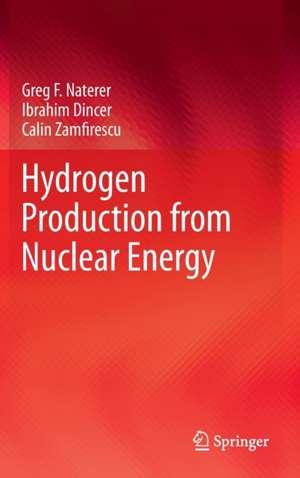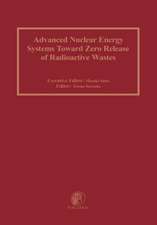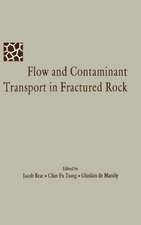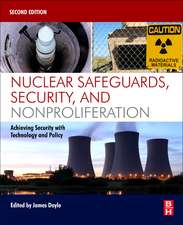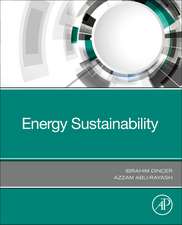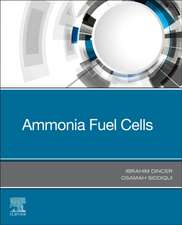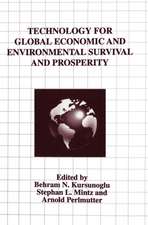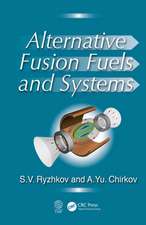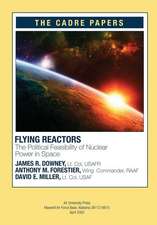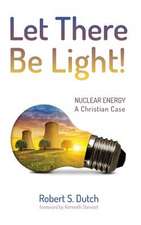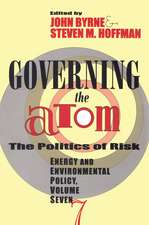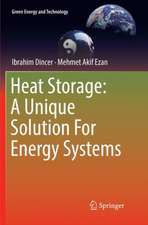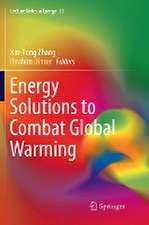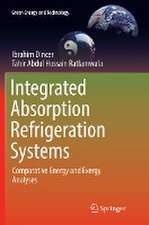Hydrogen Production from Nuclear Energy
Autor Greg F Naterer, Ibrahim Dincer, Calin Zamfirescuen Limba Engleză Hardback – 11 apr 2013
Hydrogen Production from Nuclear Energy provides an overview of the latest developments and methods of nuclear based hydrogen production, including electrolysis and thermochemical cycles. Particular focus is given to thermochemical water splitting by the copper-chlorine and sulphur-based cycles. Cycle configurations, equipment design, modeling and implementation issues are presented and discussed. The book provides the reader with an overview of the key enabling technologies towards the design and industrialization of hydrogen plants that are co-located and linked with nuclear plants in the future.
The book includes illustrations of technology developments, tables that summarize key features and results, overviews of recent advances and new methods of nuclear hydrogen production. The latest results from leading authorities in the fields will be presented, including efficiencies, costs, equipment design, and modeling.
| Toate formatele și edițiile | Preț | Express |
|---|---|---|
| Paperback (1) | 954.45 lei 6-8 săpt. | |
| SPRINGER LONDON – 4 apr 2015 | 954.45 lei 6-8 săpt. | |
| Hardback (1) | 960.78 lei 6-8 săpt. | |
| SPRINGER LONDON – 11 apr 2013 | 960.78 lei 6-8 săpt. |
Preț: 960.78 lei
Preț vechi: 1171.68 lei
-18% Nou
Puncte Express: 1441
Preț estimativ în valută:
183.87€ • 191.25$ • 151.79£
183.87€ • 191.25$ • 151.79£
Carte tipărită la comandă
Livrare economică 14-28 aprilie
Preluare comenzi: 021 569.72.76
Specificații
ISBN-13: 9781447149378
ISBN-10: 1447149378
Pagini: 508
Ilustrații: XIV, 492 p.
Dimensiuni: 155 x 235 x 33 mm
Greutate: 0.89 kg
Ediția:2013
Editura: SPRINGER LONDON
Colecția Springer
Locul publicării:London, United Kingdom
ISBN-10: 1447149378
Pagini: 508
Ilustrații: XIV, 492 p.
Dimensiuni: 155 x 235 x 33 mm
Greutate: 0.89 kg
Ediția:2013
Editura: SPRINGER LONDON
Colecția Springer
Locul publicării:London, United Kingdom
Public țintă
ResearchCuprins
Hydrogen as a Clean Energy Carrier.- Role of Nuclear Energy for Hydrogen Production.- Status of Nuclear Hydrogen Programs in the World.- Water Electrolysis.- High Temperature Electrolysis.- Thermochemical Sulfur Cycles.- Thermochemical Copper-Chlorine Cycle.- Advanced Nuclear Reactor Concepts and Designs.- Economics and Market Analysis.- Safety Aspects of Nuclear Hydrogen Production.
Notă biografică
Dr. Greg Frank Naterer is the Dean of Engineering and Professor of Mechanical Engineering at Memorial University of Newfoundland, Canada. He has made significant contributions to mechanical engineering, specifically the fields of heat transfer, hydrogen production, energy systems, multiphase flows and entropy based design. He led an international hydrogen research consortium, involving eight collaborating institutions, five countries and six industrial partners, which developed the first large-scale copper-chlorine cycle of thermochemical water splitting for hydrogen production. Dr. Naterer is a Fellow of the Canadian Society for Mechanical Engineering (CSME), American Society of Mechanical Engineers (ASME) and Engineering Institute of Canada (EIC).
Dr. Ibrahim Dincer is a full professor of Mechanical Engineering in the Faculty of Engineering and Applied Science at University of Ontario Institute of Technology. He is Vice President for Strategy in International Association for Hydrogen Energy (IAHE) and Vice-President for World Society of Sustainable Energy Technologies (WSSET). Renowned for his pioneering works in the area of sustainable energy technologies he has authored and co-authored many books, book chapters and refereed journal and conference papers. He has chaired many national and international conferences, symposia, workshops and technical meetings. He has delivered many keynote and invited lectures. He is an active member of various international scientific organizations and societies, and serves as editor-in-chief, associate editor, regional editor, and editorial board member on various prestigious international journals. He is a recipient of several research, teaching and service awards, including a Premier’s research excellence award in Ontario, Canada in 2004. He has made innovative contributions to the understanding and development ofsustainable energy technologies and their implementation, particularly through exergy. He has actively been working in the areas of hydrogen and fuel cell technologies, and his group has developed various novel technologies/methods/etc.
Dr. Calin Zamfirescu is a Senior Research Engineer at the University of Ontario Institute of Technology. His research interests include: Modeling advanced energy systems and process engineering systems, Development of low capacity heat engine for waste heat recovery, Solar driven heat engines and advanced Rankine cycles, Exergy content of solar radiation, and Fuel cells (including SOFC-H+) and combined systems with hydrogen, methane and ammonia.
Dr. Ibrahim Dincer is a full professor of Mechanical Engineering in the Faculty of Engineering and Applied Science at University of Ontario Institute of Technology. He is Vice President for Strategy in International Association for Hydrogen Energy (IAHE) and Vice-President for World Society of Sustainable Energy Technologies (WSSET). Renowned for his pioneering works in the area of sustainable energy technologies he has authored and co-authored many books, book chapters and refereed journal and conference papers. He has chaired many national and international conferences, symposia, workshops and technical meetings. He has delivered many keynote and invited lectures. He is an active member of various international scientific organizations and societies, and serves as editor-in-chief, associate editor, regional editor, and editorial board member on various prestigious international journals. He is a recipient of several research, teaching and service awards, including a Premier’s research excellence award in Ontario, Canada in 2004. He has made innovative contributions to the understanding and development ofsustainable energy technologies and their implementation, particularly through exergy. He has actively been working in the areas of hydrogen and fuel cell technologies, and his group has developed various novel technologies/methods/etc.
Dr. Calin Zamfirescu is a Senior Research Engineer at the University of Ontario Institute of Technology. His research interests include: Modeling advanced energy systems and process engineering systems, Development of low capacity heat engine for waste heat recovery, Solar driven heat engines and advanced Rankine cycles, Exergy content of solar radiation, and Fuel cells (including SOFC-H+) and combined systems with hydrogen, methane and ammonia.
Textul de pe ultima copertă
With the resurgence of nuclear power around the world, and the increasingly important role of hydrogen as a clean energy carrier, the utilization of nuclear energy for large-scale hydrogen production will have a key role in a sustainable energy future. Co-generation of both electricity and hydrogen from nuclear plants will become increasingly attractive. It enables load leveling together with renewable energy and storage of electricity in the form of hydrogen, when electricity prices and demand are lowest at off-peak hours of nuclear plants, such as overnight.
Hydrogen Production from Nuclear Energy provides an overview of the latest developments and methods of nuclear based hydrogen production, including electrolysis and thermochemical cycles. Particular focus is given to thermochemical water splitting by the copper-chlorine and sulphur-based cycles. Cycle configurations, equipment design, modeling and implementation issues are presented and discussed. The book provides the reader with an overview of the key enabling technologies towards the design and industrialization of hydrogen plants that are co-located and linked with nuclear plants in the future.
The book includes illustrations of technology developments, tables that summarize key features and results, overviews of recent advances and new methods of nuclear hydrogen production. The latest results from leading authorities in the fields will be presented, including efficiencies, costs, equipment design, and modeling.
Hydrogen Production from Nuclear Energy provides an overview of the latest developments and methods of nuclear based hydrogen production, including electrolysis and thermochemical cycles. Particular focus is given to thermochemical water splitting by the copper-chlorine and sulphur-based cycles. Cycle configurations, equipment design, modeling and implementation issues are presented and discussed. The book provides the reader with an overview of the key enabling technologies towards the design and industrialization of hydrogen plants that are co-located and linked with nuclear plants in the future.
The book includes illustrations of technology developments, tables that summarize key features and results, overviews of recent advances and new methods of nuclear hydrogen production. The latest results from leading authorities in the fields will be presented, including efficiencies, costs, equipment design, and modeling.
Caracteristici
Summarizes the latest technology developments of nuclear-based hydrogen production Provides a valuable reference for those interested in a sustainable energy future that includes nuclear and hydrogen energy Includes illustrations of technology developments and tables that summarize key features Includes supplementary material: sn.pub/extras
